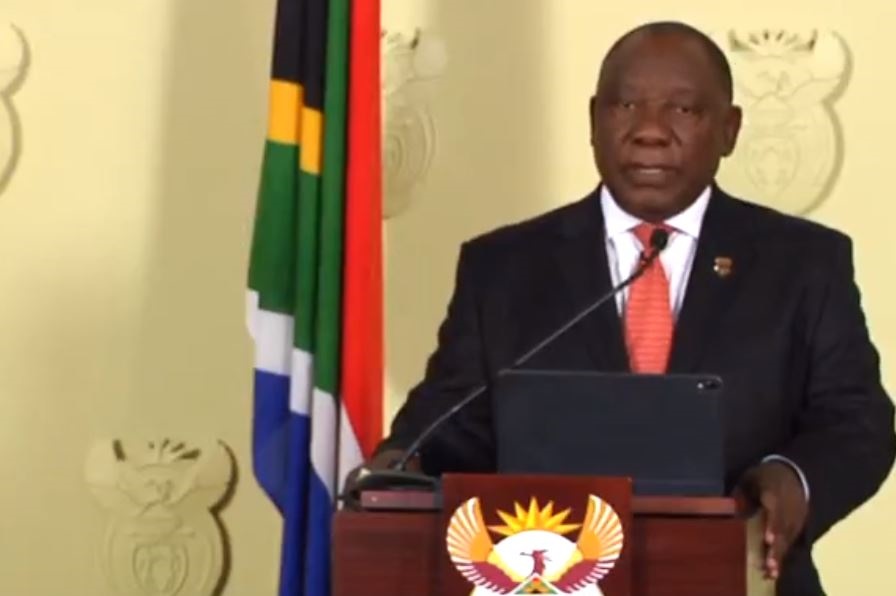
President Cyril Ramaphosa is now discovering the convergence of three crises all at once: poor governance and policy choices of the better part of the last decade, colliding with a weakened and brittle economy, being rear-ended by a global health crisis. And his government has little firepower to do anything about it, writes Pieter du Toit.
President Cyril Ramaphosa's third address to the nation in as many weeks on Monday night shows how the strain is taking its toll on him.
With the crisis around the coronavirus now having settled and the national effort to halt and stop its spread dominating every facet of society, the pressure on Ramaphosa and his government to be proactive and efficient in its response is enormous.
South Africa has had the benefit of seeing the mistakes and missteps other countries have made and has been able to evade many of the biggest errors of judgement by other nations. This government has been more responsive and reactive to the realities of the virus, and have acted with greater speed and clarity than some of the biggest developed nations in the north did.
On Monday night, Ramaphosa, visibly tired, delivered an address of a little longer than 20 minutes from his office in the Union Buildings, announcing an increase in the number of infected citizens and giving some details of a "far-reaching, intensive and unprecedented" screening programme involving 10 000 fieldworkers. They will begin random testing to try and broaden scientists' and epidemiologist' scope of the true reach of the virus.
As with his first two addresses, the first one on 15 March and the second on 23 March, Ramaphosa showed high emotional intelligence and empathy when he spoke of the "great hardship and anxiety" that almost all South Africans are feeling. He acknowledged the fear blue-collar workers, those in the informal economy and the self-employed are feeling, saying measures to provide relief to these groups are being finalised.
The president is setting a high standard a far as visibility and clarity of message is concerned. His tone, approach and demeanour is what is required of leaders during times of strife. And he is in a different class from his predecessor.
But where Ramaphosa was clearly in charge of the initial response in the first two weeks of the crisis, his and his government's inability to launch interventions are becoming increasingly clear. South Africa simply does not have the fiscal firepower or an efficient enough state to mitigate effectively against the impact of Covid-19.
"As the country went into lockdown, we received the news that the rating agency Moody's had downgraded South Africa to a sub-investment grade. This will significantly increase the cost of borrowing to fund government spending and will have a negative impact on the economy," Ramaphosa said.
Friday's downgrade came three years after Fitch and Standard and Poor’s relegated South Africa's debt to junk status in the wake of then-president Jacob Zuma’s dismissal of Pravin Gordhan and Mcebisi Jonas as minister and deputy minister of finance. It showed the ratings agencies - and foreign investors - exactly how deep the institutional rot in the government went, and cast into serious doubt any promise of sound financial management and responsible government.
READ | Junk status won't derail coronavirus fight - Ramaphosa
But Moody's, with the subsequent political upheavals in 2017 and 2018, continued to give South Africa a wide berth and gave Ramaphosa the benefit of the doubt that he would lead a firm recovery and institute urgent structural reforms. Indeed, Ramaphosa's own government, in the form of National Treasury, issued clear warnings about national debt, public sector wages and the precarious position of state-owned enterprises. And although he showed the inclination and intention, those reforms have not yet been ruthlessly and robustly implemented.
Our growing fiscal crisis, due in no small part to the above-inflation increases given to Eskom and public sector workers, as well as the deluge of bailouts awarded a host of failing public companies, has only worsened. And Moody's patience has finally run out.
What Ramaphosa is now discovering is the convergence of three crises all at once. Poor governance and policy choices of the better part of the last decade, colliding with a weakened and brittle economy, being rear-ended by a global health crisis. And his government has little to no latitude to make decisive interventions to cushion the impact on the economy and buttress the healthcare system.
In his address, he announced Naspers would donate R500 million to the Solidarity Fund, but even more importantly, will purchase R1 billion worth of medical and personal protective equipment in China and deliver it to the country. This in addition to a similar donation by Chinese mogul Jack Ma, and assistance by Patrice Motsepe (R1 billion), Johann Rupert (R1 billion) and Nicky and Jonathan Oppenheimer (R1 billion).
Ramaphosa's government has been hamstrung by years of mismanagement by the ANC. It has led to an erosion of the country's fiscal position, entrenched a culture of wastage and corruption, undermined confidence in the economy and policymakers and chipped away at the South Africa's status as a preferential emerging market economy.
And now, with a global calamity impacting on our biggest trading partners, the world economy in retreat and a capable state now needed as never before, Ramaphosa is heavily reliant on donations and goodwill. He is acting from perhaps the weakest position a democratic head of state has been in over the last 20 years.
"This is uncharted territory for us all," Ramaphosa said in closing.
"We have never experienced a situation like this before and a number of mistakes will be made, but we ask for our people's understanding that all this is being done for the good of everyone. We will continue to correct the mistakes wherever they are made."
South Africans will forgive him the mistakes that cannot be prevented. It is those that were eminently preventable though that grate.




 Publications
Publications
 Partners
Partners























